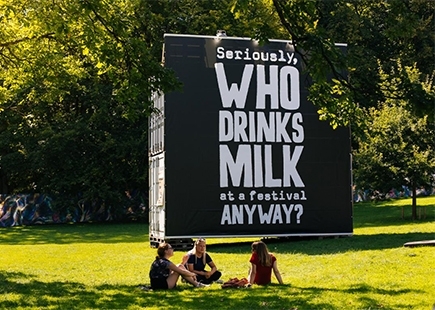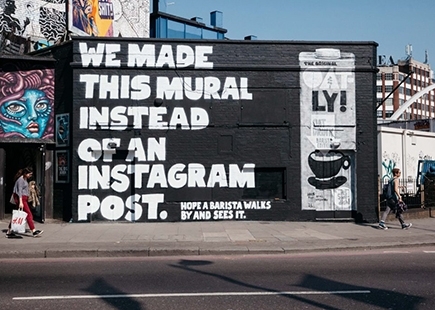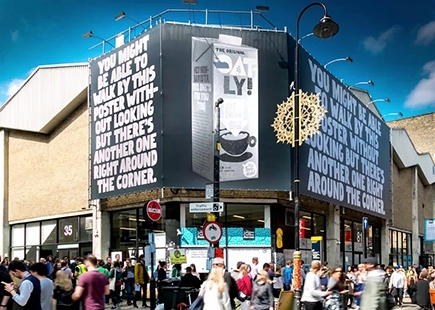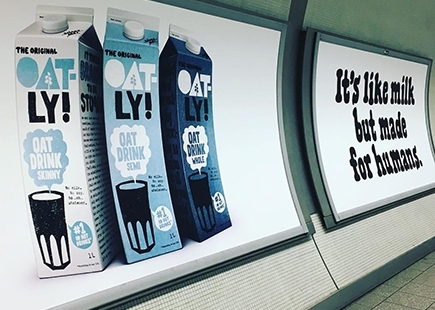Why Oatly got people thinking differently about vegan milk alternatives

The Background
Veganuary has been dominated by Gregg’s and its well-executed vegan sausage roll launch bringing debate around veganism to the masses.
However, Oatly, the Swedish brand, has been catching my eye through its approach to marketing animal-friendly products for a while.
It’s a busy market with different messages bombarding consumers and the classic approach has been to hone in on the health benefits of vegan products for humans and nature – take a look at Alpro – “Good for you, and the planet” it proclaims in its functional packaging.
The Big Idea
“It’s like milk but made for humans.”
That’s the line Oatly has built (and often defended) its brand on.
In Sweden it faced backlash from the powerful dairy lobby – a massive collection of companies.
It’s a contentious statement, but to be fair, it’s weird to drink another animal’s milk made for its babies, right?
What They Did
Oatly brought this campaign to the UK with a reported £700k campaign with posters across key stations and areas in London.
Its media buy at King’s Cross Underground Station saw the message repeated the full length of the station from ticket hall to Victoria Line – anyone familiar with that journey will know how much ad space that is.
The creative was bold and simple – its well-versed statement and the product. Ad spaces were large with the full station takeovers on the Underground and other large spaces in areas like Peckham and Shoreditch.
There was also limited social media and PR running alongside, we’ll come onto that…




The Review
The simplicity of the ad and the bold statement definitely grabs your attention. Taking the ‘norm’ of drinking cows’ milk and turning it upside down in seven words to create a talking point is a really impactful one for a brand that’s relatively new to the market. The tone can be seen throughout its recent marketing campaigns, for example referring to dairy milk as “cows’ bodily fluids” and it helps give the brand a strong voice and it feels confident.
Sticking punchy statements out there with no other information on the product helps with those conversations.
In essence, it’s saying “it’s not all about this amazing product we’ve produced, it’s actually you guys being weird that led us here”. It kind of makes me think about the show The Good Place and the way it looks at humans in a humorous way – one to add to your list on Netflix. What it didn’t quite achieve in the UK was any kind of full-blown outrage in the same way it did in Sweden and there was no triggering of Piers Morgan. Perhaps that’s no bad thing.
The branding plays its part too, when you compare it to Alpro you can tell which one’s going to appeal most on the supermarket shelf to modern, urban consumers. Another campaign element that stood out was the 80% off coffee at some of London’s top independent coffee shops.
Why? Because oat milk results in an 80% reduction in CO2 emissions – simple and effective by saving people money.
Where this campaign’s downfall comes is in the PR – a perfect example of a lack of integration.
The brand is fun, bold and confident so why is the PR output running alongside the ad campaign a survey story?
In summary: Millennials spend £300 a year more on food than their parents due to a passion for ‘trendy’ foods. The top five items in their baskets include hummus, avocado, kale, falafel and (you guessed it) plant based non-dairy milk. Pretty lazy stuff.
It’s a shame because the brand is a champion for the choices this demographic makes, such as veganism, sustainability and transparency. This survey does nothing to champion the audience or the choices it makes. Instead the survey just helps tabloid newspapers make the target consumer out to be stereotypically splurging money on ‘trendy’ luxuries. There’s even a stat in there about millennials not knowing the price of a pint of milk, lapped up by the Mail Online of course.
I guess ultimately the proof of the campaign’s success from an Oatly perspective is probably the fact it suffered supply shortages throughout December, but unfortunately, it wasn’t down to the PR side of the campaign.
In Hindsight
It’s just a London campaign, and I’m sure that makes sense at the moment, but I do wonder if it could have taken the message a little further through social media.
As mentioned, the ads prompted conversation on other channels, but the brand is absent from that and doesn’t post the slogan in the same bold way. Maybe its hesitation is because of the backlash in Sweden (and it only has the one Instagram profile) but there’s a chance to keep the brand’s message consistent and fearless.
And then there’s the PR side of things.
Rather than a survey that could quite easily have annoyed target consumers (had it received more coverage), there’s the opportunity to be as daring and brave as the advertising creative. A campaign concentrating on the brand’s positive messages around its impact on the environment or the main campaign tagline could have reaped a better return.
And a final point, can it start producing more of its barista edition?
The stuff has become rarer than a non-vegan product launch in January.
If you enjoyed this article, you can subscribe for free to our weekly email alert and receive a regular curation of the best creative campaigns by creatives themselves.
Published on:


